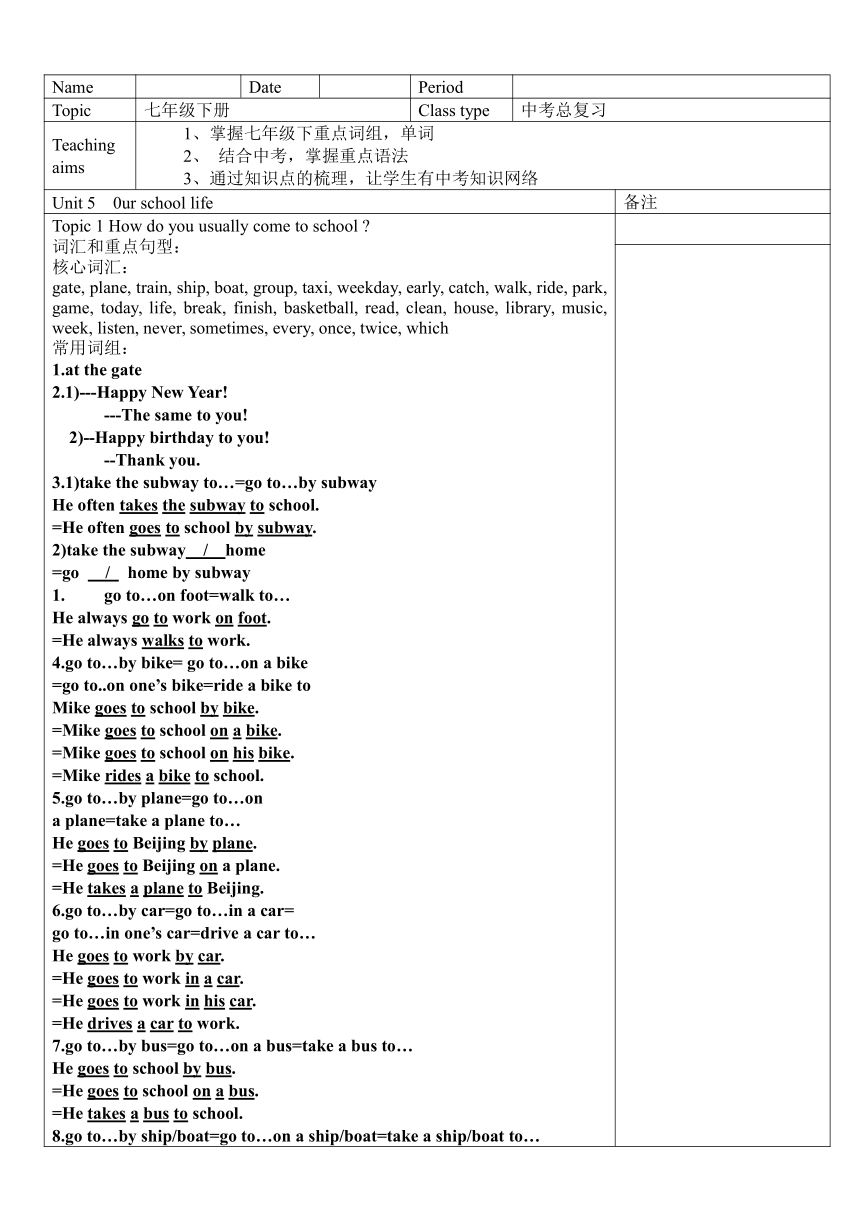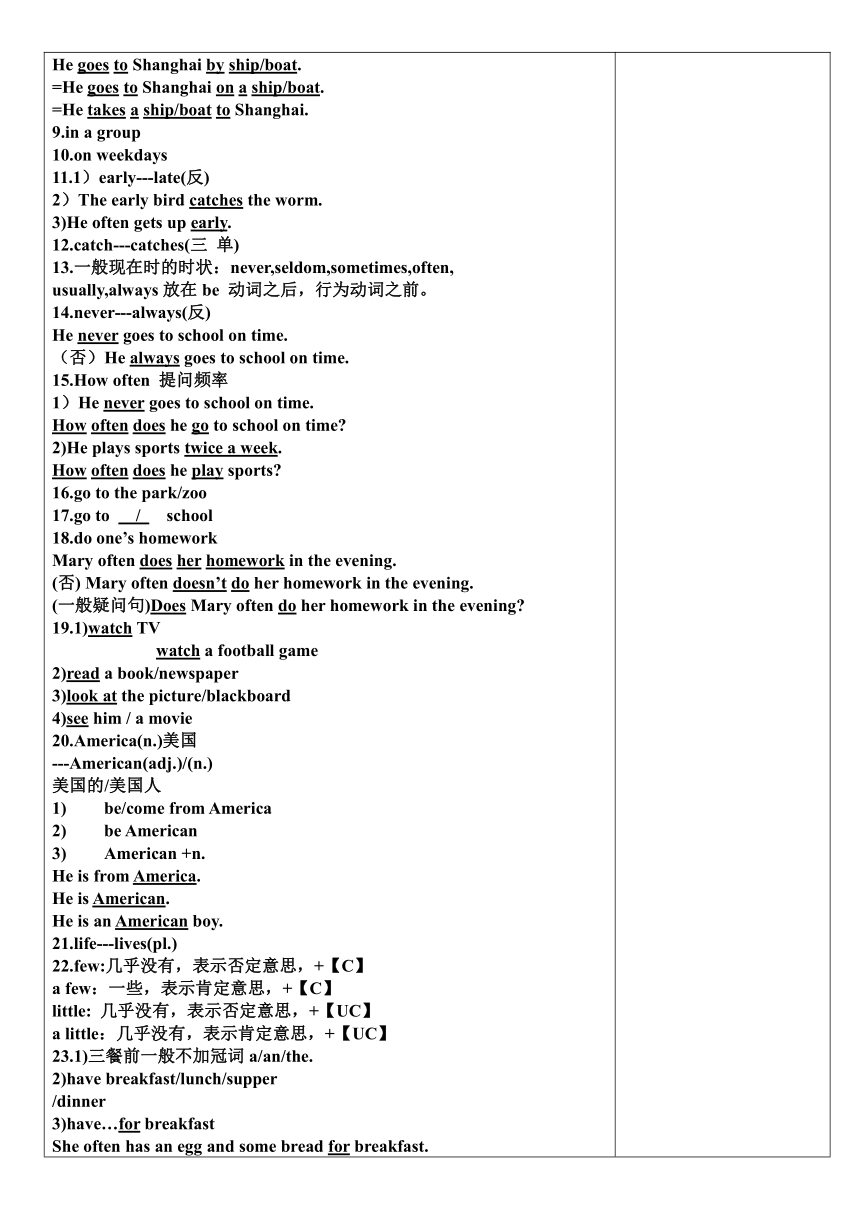2024年仁爱版中考英语复习七年级下册Unit 5 Topic1教案(表格式)
文档属性
| 名称 | 2024年仁爱版中考英语复习七年级下册Unit 5 Topic1教案(表格式) |

|
|
| 格式 | doc | ||
| 文件大小 | 60.5KB | ||
| 资源类型 | 教案 | ||
| 版本资源 | 仁爱科普版 | ||
| 科目 | 英语 | ||
| 更新时间 | 2024-04-05 21:12:42 | ||
图片预览


文档简介
Name Date Period
Topic 七年级下册 Class type 中考总复习
Teaching aims 1、掌握七年级下重点词组,单词 2、 结合中考,掌握重点语法 3、通过知识点的梳理,让学生有中考知识网络
Unit 5 0ur school life 备注
Topic 1 How do you usually come to school 词汇和重点句型:核心词汇:gate, plane, train, ship, boat, group, taxi, weekday, early, catch, walk, ride, park, game, today, life, break, finish, basketball, read, clean, house, library, music, week, listen, never, sometimes, every, once, twice, which常用词组:1.at the gate2.1)---Happy New Year!---The same to you!2)--Happy birthday to you!--Thank you.3.1)take the subway to…=go to…by subwayHe often takes the subway to school.=He often goes to school by subway.2)take the subway / home=go / home by subwaygo to…on foot=walk to…He always go to work on foot.=He always walks to work.4.go to…by bike= go to…on a bike=go to..on one’s bike=ride a bike toMike goes to school by bike.=Mike goes to school on a bike.=Mike goes to school on his bike.=Mike rides a bike to school.5.go to…by plane=go to…ona plane=take a plane to…He goes to Beijing by plane.=He goes to Beijing on a plane.=He takes a plane to Beijing.6.go to…by car=go to…in a car=go to…in one’s car=drive a car to…He goes to work by car.=He goes to work in a car.=He goes to work in his car.=He drives a car to work.7.go to…by bus=go to…on a bus=take a bus to…He goes to school by bus.=He goes to school on a bus.=He takes a bus to school.8.go to…by ship/boat=go to…on a ship/boat=take a ship/boat to…He goes to Shanghai by ship/boat.=He goes to Shanghai on a ship/boat.=He takes a ship/boat to Shanghai.9.in a group10.on weekdays 11.1)early---late(反)2)The early bird catches the worm.3)He often gets up early.12.catch---catches(三 单)13.一般现在时的时状:never,seldom,sometimes,often,usually,always放在be 动词之后,行为动词之前。14.never---always(反)He never goes to school on time.(否)He always goes to school on time.15.How often 提问频率1)He never goes to school on time.How often does he go to school on time 2)He plays sports twice a week.How often does he play sports 16.go to the park/zoo17.go to / school 18.do one’s homeworkMary often does her homework in the evening.(否) Mary often doesn’t do her homework in the evening.(一般疑问句)Does Mary often do her homework in the evening 19.1)watch TVwatch a football game2)read a book/newspaper3)look at the picture/blackboard4)see him / a movie 20.America(n.)美国---American(adj.)/(n.)美国的/美国人be/come from Americabe AmericanAmerican +n.He is from America.He is American.He is an American boy.21.life---lives(pl.)22.few:几乎没有,表示否定意思,+【C】a few:一些,表示肯定意思,+【C】little: 几乎没有,表示否定意思,+【UC】a little:几乎没有,表示肯定意思,+【UC】23.1)三餐前一般不加冠词a/an/the.2)have breakfast/lunch/supper/dinner3)have…for breakfastShe often has an egg and some bread for breakfast.24.at / school/home25.1)have a rest2)have a short rest have a good rest26.球类前不加the, 乐器前加the.1)play / basketball/football(soccer)2)play the guitar重点句型:Li Xiang often rides a bike to school.We want to know about the school life of American students.She has breakfast with her parents.Work must come first.The early bird catches the worm.交际用语:– Happy New Year! –The same to you.– Do you often read books in the library –Yes, I do./ No, I don’t. –How often do you go to the library – There times a week.语法精粹:一般现在时概述
一般现在时表示习惯性、经常性、反复性的动作或存在的状态。“习惯性、经常性、反复性”是一般现在时的三大特性,它不表示特定时间内发生的事。
二、一般现在时的结构
时态的结构指的是动词的变化形式。一般现在时间有两种结构,一种是动词原形,用于主语为非第三人称时的情况;另一种为动词的第三人称单数形式,用于主语为第三人称时的情况。Eg1.We often get up early in the morning.
Eg2.My father often gets up early in the morning.
三、谈谈“主语为三单,其后动词s添”
在一般现在时中,当主语为第三人称单数时,谓语动词要用第三人称单数形式。可以简单叙述为“主语为三单,其后动词s添”。何谓第三人称单数?用一句话概括就是“非你、非我、非复数”,如he, she, it, my father, my mother, my sister, our English teacher, Tom, Mike, Liu Jia, China, my book, etc.
Eg3.He sometimes goes to school by bike.
Eg4.My father works in the hospital as a doctor.
四、动词第三人称单数变化规则
动词第三人称变化的规则与可数名词复数变化的规则相同。
规则一、一般在词尾加-s。如:looks, puts. reads, sees, skis等。
规则二、以-o, -s, -x, -sh, -ch结尾的加-es。如:goes, does, misses, passes, mixes, fixes, pushes, wishes, watches, teaches,等。
规则三、以辅音字母加y结尾的,变y为i,再加-es。注意一定是辅音字母加y才变,若是元音字母加y,则直接加-s。
如:fly → flies, try → tries, fry → fries, copy → copies
buy → buys, enjoy → enjoys, play → plays, say → says, pay → pays五、一般现在时的句子转换当句子中有be动词或情态动词时,则把be动词或情态动词(can,could等等)提到主语的前面变成一般疑问句;在be动词或情态动词后面加not变成否定句.例:①陈述句:She is a student.一般疑问句→ Is she a student 否定句→ She is not a student.②陈述句:I can swim.一般疑问句→ Can you swim 否定句→ I can not swim.当句子中即没有be动词,也没有情态动词时,则在主语前加助动词do (you,以及复数), does(单数she,he,it)变成一般疑问句;在主语后谓语动词前加助动词don’t(I,you,以及复数), doesn’t(单数she,he,it)变成否定句,助动词后的动词要变成动词原形。例:①陈述句:We get up at 7:00 every morning.一般疑问句→Do you get up at 7:00 every morning 否定句→We don’t get up at 7:00 every morning.②陈述句:She has a little brother.一般疑问句→ Does she have a little brother 否定句→ She doesn’t have a little brother.
Thoughts after teaching :
Topic 七年级下册 Class type 中考总复习
Teaching aims 1、掌握七年级下重点词组,单词 2、 结合中考,掌握重点语法 3、通过知识点的梳理,让学生有中考知识网络
Unit 5 0ur school life 备注
Topic 1 How do you usually come to school 词汇和重点句型:核心词汇:gate, plane, train, ship, boat, group, taxi, weekday, early, catch, walk, ride, park, game, today, life, break, finish, basketball, read, clean, house, library, music, week, listen, never, sometimes, every, once, twice, which常用词组:1.at the gate2.1)---Happy New Year!---The same to you!2)--Happy birthday to you!--Thank you.3.1)take the subway to…=go to…by subwayHe often takes the subway to school.=He often goes to school by subway.2)take the subway / home=go / home by subwaygo to…on foot=walk to…He always go to work on foot.=He always walks to work.4.go to…by bike= go to…on a bike=go to..on one’s bike=ride a bike toMike goes to school by bike.=Mike goes to school on a bike.=Mike goes to school on his bike.=Mike rides a bike to school.5.go to…by plane=go to…ona plane=take a plane to…He goes to Beijing by plane.=He goes to Beijing on a plane.=He takes a plane to Beijing.6.go to…by car=go to…in a car=go to…in one’s car=drive a car to…He goes to work by car.=He goes to work in a car.=He goes to work in his car.=He drives a car to work.7.go to…by bus=go to…on a bus=take a bus to…He goes to school by bus.=He goes to school on a bus.=He takes a bus to school.8.go to…by ship/boat=go to…on a ship/boat=take a ship/boat to…He goes to Shanghai by ship/boat.=He goes to Shanghai on a ship/boat.=He takes a ship/boat to Shanghai.9.in a group10.on weekdays 11.1)early---late(反)2)The early bird catches the worm.3)He often gets up early.12.catch---catches(三 单)13.一般现在时的时状:never,seldom,sometimes,often,usually,always放在be 动词之后,行为动词之前。14.never---always(反)He never goes to school on time.(否)He always goes to school on time.15.How often 提问频率1)He never goes to school on time.How often does he go to school on time 2)He plays sports twice a week.How often does he play sports 16.go to the park/zoo17.go to / school 18.do one’s homeworkMary often does her homework in the evening.(否) Mary often doesn’t do her homework in the evening.(一般疑问句)Does Mary often do her homework in the evening 19.1)watch TVwatch a football game2)read a book/newspaper3)look at the picture/blackboard4)see him / a movie 20.America(n.)美国---American(adj.)/(n.)美国的/美国人be/come from Americabe AmericanAmerican +n.He is from America.He is American.He is an American boy.21.life---lives(pl.)22.few:几乎没有,表示否定意思,+【C】a few:一些,表示肯定意思,+【C】little: 几乎没有,表示否定意思,+【UC】a little:几乎没有,表示肯定意思,+【UC】23.1)三餐前一般不加冠词a/an/the.2)have breakfast/lunch/supper/dinner3)have…for breakfastShe often has an egg and some bread for breakfast.24.at / school/home25.1)have a rest2)have a short rest have a good rest26.球类前不加the, 乐器前加the.1)play / basketball/football(soccer)2)play the guitar重点句型:Li Xiang often rides a bike to school.We want to know about the school life of American students.She has breakfast with her parents.Work must come first.The early bird catches the worm.交际用语:– Happy New Year! –The same to you.– Do you often read books in the library –Yes, I do./ No, I don’t. –How often do you go to the library – There times a week.语法精粹:一般现在时概述
一般现在时表示习惯性、经常性、反复性的动作或存在的状态。“习惯性、经常性、反复性”是一般现在时的三大特性,它不表示特定时间内发生的事。
二、一般现在时的结构
时态的结构指的是动词的变化形式。一般现在时间有两种结构,一种是动词原形,用于主语为非第三人称时的情况;另一种为动词的第三人称单数形式,用于主语为第三人称时的情况。Eg1.We often get up early in the morning.
Eg2.My father often gets up early in the morning.
三、谈谈“主语为三单,其后动词s添”
在一般现在时中,当主语为第三人称单数时,谓语动词要用第三人称单数形式。可以简单叙述为“主语为三单,其后动词s添”。何谓第三人称单数?用一句话概括就是“非你、非我、非复数”,如he, she, it, my father, my mother, my sister, our English teacher, Tom, Mike, Liu Jia, China, my book, etc.
Eg3.He sometimes goes to school by bike.
Eg4.My father works in the hospital as a doctor.
四、动词第三人称单数变化规则
动词第三人称变化的规则与可数名词复数变化的规则相同。
规则一、一般在词尾加-s。如:looks, puts. reads, sees, skis等。
规则二、以-o, -s, -x, -sh, -ch结尾的加-es。如:goes, does, misses, passes, mixes, fixes, pushes, wishes, watches, teaches,等。
规则三、以辅音字母加y结尾的,变y为i,再加-es。注意一定是辅音字母加y才变,若是元音字母加y,则直接加-s。
如:fly → flies, try → tries, fry → fries, copy → copies
buy → buys, enjoy → enjoys, play → plays, say → says, pay → pays五、一般现在时的句子转换当句子中有be动词或情态动词时,则把be动词或情态动词(can,could等等)提到主语的前面变成一般疑问句;在be动词或情态动词后面加not变成否定句.例:①陈述句:She is a student.一般疑问句→ Is she a student 否定句→ She is not a student.②陈述句:I can swim.一般疑问句→ Can you swim 否定句→ I can not swim.当句子中即没有be动词,也没有情态动词时,则在主语前加助动词do (you,以及复数), does(单数she,he,it)变成一般疑问句;在主语后谓语动词前加助动词don’t(I,you,以及复数), doesn’t(单数she,he,it)变成否定句,助动词后的动词要变成动词原形。例:①陈述句:We get up at 7:00 every morning.一般疑问句→Do you get up at 7:00 every morning 否定句→We don’t get up at 7:00 every morning.②陈述句:She has a little brother.一般疑问句→ Does she have a little brother 否定句→ She doesn’t have a little brother.
Thoughts after teaching :
同课章节目录
